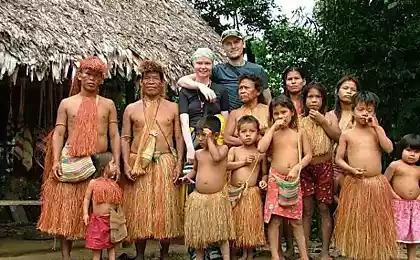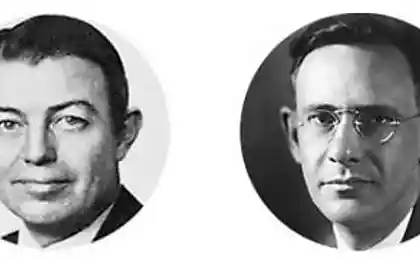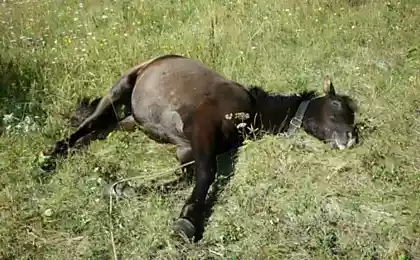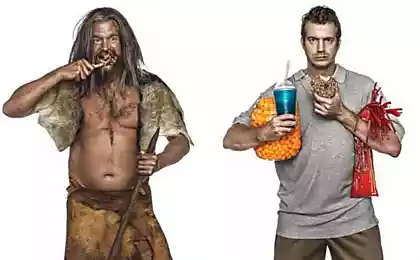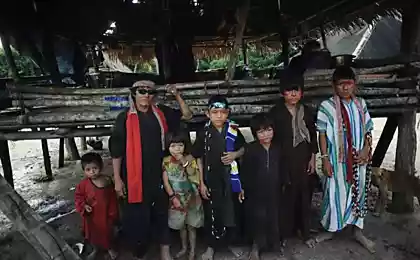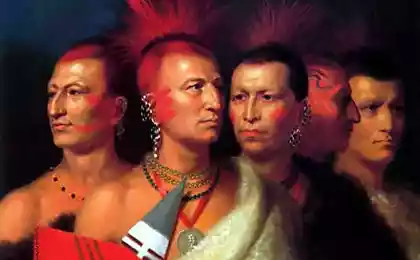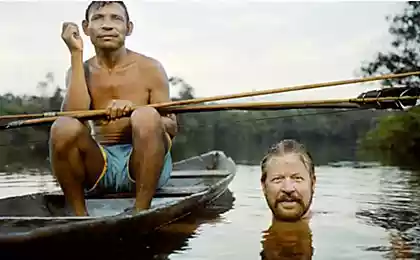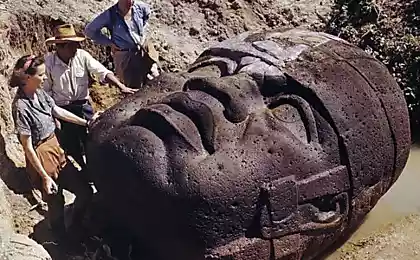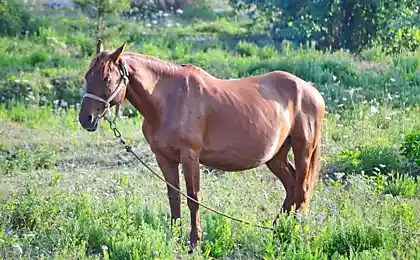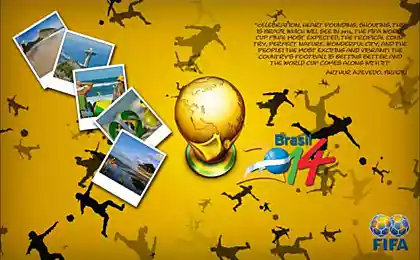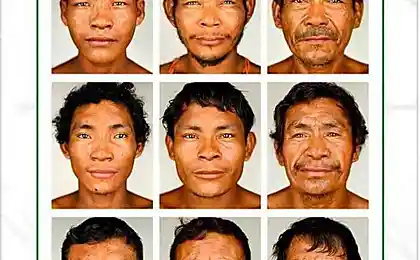523
The piraha people who don't sleep
At the river Nor in Brazil is living an extraordinary Indian tribe of Piraha. With a unique way of life and their faith. Writer and former missionary Daniel Everett lived among the piraha 30 years! During this time he lost faith in the human values of the modern world.
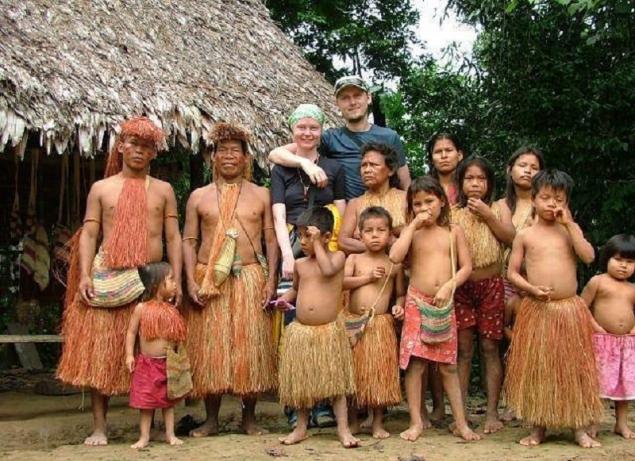
People who don't sleep.
What they say to each other people, going to bed? In different cultures wishes are heard, of course, different, but everywhere they Express the speaker's hope that his opponent will sleep sweetly, dream of pink butterflies and Wake up in the morning fresh and full of energy. In piroski "good night" sounds like "don't try to sleep in. There are snakes everywhere!"
The piraha believe that sleep is harmful. First, the sleep makes you weak. Second, in a dream you would die and Wake up a slightly different person. And the problem is not that this new person you don't like it — you will simply cease to be you if she will sleep too long and too often. And, third, there really snakes in bulk. So the piraha can't sleep at night. Dozing fitfully, for 20-30 minutes, leaning against the wall of a palm hut or prokorov under the tree. And the rest of the time chatting, laughing, making something, dancing around campfires and playing with children and dogs. However, the dream slowly mutates piraha — any of them remember what it used instead was some other people.
"Those were much smaller, were not able to have sex and even ate the milk from the Breasts. And then those people all gone, and now instead of them — I. And if I don't sleep for a long time, it may not disappear. Finding that focus is not working and I switched again, I'll take another name..." the average piraha change the name every 6-7 years, and for each age they have their appropriate names, so that name you can always say, talking about a child, teenager, youth, man or old man
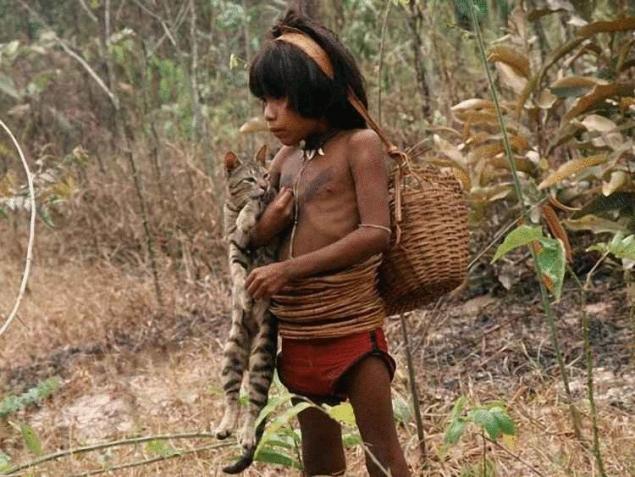
People without tomorrow.
Perhaps this is the device of life in which night sleep does not share days with the inevitability of a metronome, let the piraha set a very strange relationship with the category of time. They do not know what "tomorrow" and what is "today", and also poorly oriented concepts "past" and "future". So no calendars, counting time, and other conventions of piraha don't know. And because they never think about the future, they just do not know how to do it.
Everett first visited the piraha in 1976, when about the piraha were not known. And the linguist-missionary-ethnographer experienced the first shock, when they saw that the piraha don't do food. At all. To the tribe, in fact, leading a primitive life without caring about the day to come — that the canons cannot. But the fact remains that the piraha don't hoard food, or just catch them and eat (or do not catch and do not eat if hunting-fishing happiness they change).
When the piraha have no food, they relate to it phlegmatic. He does not understand why there is a every day and even several times. They eat at most twice a day and often arrange fasting days, even when the food in the village a lot.
People without numbers.
Long time mission failed, trying to enlighten the hearts of the piraha and direct them to the Lord. No, the piraha kindly met representatives of the Catholic and Protestant missionary organizations, with the pleasure of covering their nakedness beautiful donated shorts and ate canned stewed cans. But the communication has actually ended.
No one was able to understand the language of the piraha. Therefore, the Evangelical Church of the United States did the smart thing: sent a young but talantlivogo linguist. Everett was ready for the fact that the language will be difficult, but he was wrong: "This language was not complicated, he was unique. Nothing like the Ground is not found"
There are only seven consonants and three vowels. More problems with vocabulary. Piraha pronouns do not know and if they need to show in speech the difference between "I" and "thou" and "they" piraha clumsy use of pronouns, which are used by their neighbours the Indians Tupi (the only people with whom the piraha somehow contacted)
Verbs and nouns, they are not particularly divided, and generally familiar to us language rules here, it seems, drowned as useless. For example, the piraha do not understand the meaning of "one". Here badgers, crows, dogs understand, and piraha — no. For them it is so complicated philosophical category that anyone who tries to tell the piraha, what it is, at the same time can recite the theory of relativity.
Numbers and accounts they don't know, doing just two concepts: "a few" and "many". Two, three and four piranhas are a few, but six was obviously a lot. And what is a piranha? It's just the piranha. Russian is easier to explain why you need the articles before the words, than to explain why the piraha to count a piranha if it is a piranha, which need not be considered. So the piraha never believe that they're little people. There are 300 people, and it is definitely much. About 7 billion to talk to them is useless: 7 billion is too much. You have a lot, and we mgogo, it's just wonderful.
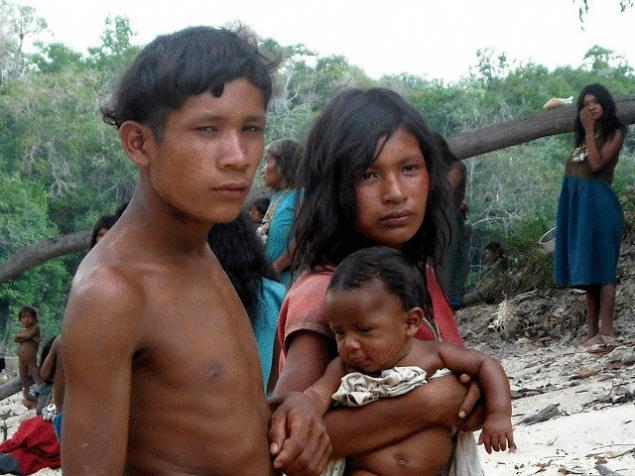
People without courtesy.
"Hello," "how are you?", "thank you", "goodbye", "sorry", "please" — a lot of words people in the world use to show how well they relate to each other. None of the above the piraha do not use. And without it, they just love each other and I have no doubt that all around the a priori glad to have them. Courtesy is a by — child mutual distrust — feelings, which the piraha, according to Everett, are deprived completely.
People without shame.
The piraha do not know what shame, guilt or resentment. If Haaahaaa dropped the fish in the water is bad. No fish, no dinner. But where does Haaahaaa? He just dropped the fish in the water. If little Kiaya pushed Akioka, then it's bad because Ocionia broke his leg and it needs to be treated. But it happened because it happened, that's all.
Even malenica children is not abused and not shamed. They can report that to miss coals from a fire silly, playing on the shore of the child will hold, so he didn't fall in the river, but scolding the piraha do not know.
If breast baby takes the mother's breast — so no one will feed him forcibly: he knows better why he's not eating. If a woman, who had gone to the river to give birth cannot give birth and the third day announces screaming forest — so she doesn't want to give birth in fact, and wants to die. There is no need to go there and convince her to do it. Well, the husband can still go there — if he can find good arguments. But why there trying to escape the white man with the strange iron pieces in a box?
People who see more.
The piraha have surprisingly little rituals and religious beliefs. The piraha know they like all living things — the children of the forest. The forest is full of secrets... even there, the forest is a universe devoid of laws, logic, and orderliness. In the forest lives a lot of spirits. There goes all dead. Therefore, the forest is scary.
But the fear of piraha is not fear Europeans. When we are afraid, we feel bad. Piraha think fear is a very strong feeling, not devoid of charm opredelennogo. We can say that they love fear.
Once Everett waking up in the morning saw that the whole village gathered on the shore. It turned out that there came a Ghost who wanted something to warn the piraha. Leaving the beach, Everett found that the crowd stood around the empty space, and frightened, but lively with this empty place talked. The words: "there's no one There! I don't see anything," Everett replied that he was not supposed to see, as the spirit came to the piraha. And if he needs to be Everett, then he will be sent a personal spirit.
People without God.
All of the above did the piraha impossible object for missionerlik work. The idea of one God, for example, slip among them for the reason that with the concept of "one" of piraha, as already mentioned, not friendly. Reports that someone created, also perceived the piraha, puzzled. Wow, such a big and intelligent like a man, and doesn't know how to make people.
The story of Jesus Christ, translated into piroski also looked not too convincingly. The concept of "age" "time" and "history" to empty the piraha sound. Listening to about a very good man, whom wicked men nailed to the tree with nails, piraha Everett asked if he had seen it himself. No? Did Everett the man who saw the Christ? Too, no? Then how would he know what it was?
Living among these little, half-starved, never sleeping, never hurrying, constantly laughing he came to the conclusion that man is much more complex creature than tells the Bible, and religion makes us neither better nor happier. Only years later he realized that he needed to learn piraha, not the other way around. source: maliy.livejournal.com
Source: /users/1077

People who don't sleep.
What they say to each other people, going to bed? In different cultures wishes are heard, of course, different, but everywhere they Express the speaker's hope that his opponent will sleep sweetly, dream of pink butterflies and Wake up in the morning fresh and full of energy. In piroski "good night" sounds like "don't try to sleep in. There are snakes everywhere!"
The piraha believe that sleep is harmful. First, the sleep makes you weak. Second, in a dream you would die and Wake up a slightly different person. And the problem is not that this new person you don't like it — you will simply cease to be you if she will sleep too long and too often. And, third, there really snakes in bulk. So the piraha can't sleep at night. Dozing fitfully, for 20-30 minutes, leaning against the wall of a palm hut or prokorov under the tree. And the rest of the time chatting, laughing, making something, dancing around campfires and playing with children and dogs. However, the dream slowly mutates piraha — any of them remember what it used instead was some other people.
"Those were much smaller, were not able to have sex and even ate the milk from the Breasts. And then those people all gone, and now instead of them — I. And if I don't sleep for a long time, it may not disappear. Finding that focus is not working and I switched again, I'll take another name..." the average piraha change the name every 6-7 years, and for each age they have their appropriate names, so that name you can always say, talking about a child, teenager, youth, man or old man

People without tomorrow.
Perhaps this is the device of life in which night sleep does not share days with the inevitability of a metronome, let the piraha set a very strange relationship with the category of time. They do not know what "tomorrow" and what is "today", and also poorly oriented concepts "past" and "future". So no calendars, counting time, and other conventions of piraha don't know. And because they never think about the future, they just do not know how to do it.
Everett first visited the piraha in 1976, when about the piraha were not known. And the linguist-missionary-ethnographer experienced the first shock, when they saw that the piraha don't do food. At all. To the tribe, in fact, leading a primitive life without caring about the day to come — that the canons cannot. But the fact remains that the piraha don't hoard food, or just catch them and eat (or do not catch and do not eat if hunting-fishing happiness they change).
When the piraha have no food, they relate to it phlegmatic. He does not understand why there is a every day and even several times. They eat at most twice a day and often arrange fasting days, even when the food in the village a lot.
People without numbers.
Long time mission failed, trying to enlighten the hearts of the piraha and direct them to the Lord. No, the piraha kindly met representatives of the Catholic and Protestant missionary organizations, with the pleasure of covering their nakedness beautiful donated shorts and ate canned stewed cans. But the communication has actually ended.
No one was able to understand the language of the piraha. Therefore, the Evangelical Church of the United States did the smart thing: sent a young but talantlivogo linguist. Everett was ready for the fact that the language will be difficult, but he was wrong: "This language was not complicated, he was unique. Nothing like the Ground is not found"
There are only seven consonants and three vowels. More problems with vocabulary. Piraha pronouns do not know and if they need to show in speech the difference between "I" and "thou" and "they" piraha clumsy use of pronouns, which are used by their neighbours the Indians Tupi (the only people with whom the piraha somehow contacted)
Verbs and nouns, they are not particularly divided, and generally familiar to us language rules here, it seems, drowned as useless. For example, the piraha do not understand the meaning of "one". Here badgers, crows, dogs understand, and piraha — no. For them it is so complicated philosophical category that anyone who tries to tell the piraha, what it is, at the same time can recite the theory of relativity.
Numbers and accounts they don't know, doing just two concepts: "a few" and "many". Two, three and four piranhas are a few, but six was obviously a lot. And what is a piranha? It's just the piranha. Russian is easier to explain why you need the articles before the words, than to explain why the piraha to count a piranha if it is a piranha, which need not be considered. So the piraha never believe that they're little people. There are 300 people, and it is definitely much. About 7 billion to talk to them is useless: 7 billion is too much. You have a lot, and we mgogo, it's just wonderful.

People without courtesy.
"Hello," "how are you?", "thank you", "goodbye", "sorry", "please" — a lot of words people in the world use to show how well they relate to each other. None of the above the piraha do not use. And without it, they just love each other and I have no doubt that all around the a priori glad to have them. Courtesy is a by — child mutual distrust — feelings, which the piraha, according to Everett, are deprived completely.
People without shame.
The piraha do not know what shame, guilt or resentment. If Haaahaaa dropped the fish in the water is bad. No fish, no dinner. But where does Haaahaaa? He just dropped the fish in the water. If little Kiaya pushed Akioka, then it's bad because Ocionia broke his leg and it needs to be treated. But it happened because it happened, that's all.
Even malenica children is not abused and not shamed. They can report that to miss coals from a fire silly, playing on the shore of the child will hold, so he didn't fall in the river, but scolding the piraha do not know.
If breast baby takes the mother's breast — so no one will feed him forcibly: he knows better why he's not eating. If a woman, who had gone to the river to give birth cannot give birth and the third day announces screaming forest — so she doesn't want to give birth in fact, and wants to die. There is no need to go there and convince her to do it. Well, the husband can still go there — if he can find good arguments. But why there trying to escape the white man with the strange iron pieces in a box?
People who see more.
The piraha have surprisingly little rituals and religious beliefs. The piraha know they like all living things — the children of the forest. The forest is full of secrets... even there, the forest is a universe devoid of laws, logic, and orderliness. In the forest lives a lot of spirits. There goes all dead. Therefore, the forest is scary.
But the fear of piraha is not fear Europeans. When we are afraid, we feel bad. Piraha think fear is a very strong feeling, not devoid of charm opredelennogo. We can say that they love fear.
Once Everett waking up in the morning saw that the whole village gathered on the shore. It turned out that there came a Ghost who wanted something to warn the piraha. Leaving the beach, Everett found that the crowd stood around the empty space, and frightened, but lively with this empty place talked. The words: "there's no one There! I don't see anything," Everett replied that he was not supposed to see, as the spirit came to the piraha. And if he needs to be Everett, then he will be sent a personal spirit.
People without God.
All of the above did the piraha impossible object for missionerlik work. The idea of one God, for example, slip among them for the reason that with the concept of "one" of piraha, as already mentioned, not friendly. Reports that someone created, also perceived the piraha, puzzled. Wow, such a big and intelligent like a man, and doesn't know how to make people.
The story of Jesus Christ, translated into piroski also looked not too convincingly. The concept of "age" "time" and "history" to empty the piraha sound. Listening to about a very good man, whom wicked men nailed to the tree with nails, piraha Everett asked if he had seen it himself. No? Did Everett the man who saw the Christ? Too, no? Then how would he know what it was?
Living among these little, half-starved, never sleeping, never hurrying, constantly laughing he came to the conclusion that man is much more complex creature than tells the Bible, and religion makes us neither better nor happier. Only years later he realized that he needed to learn piraha, not the other way around. source: maliy.livejournal.com
Source: /users/1077
BMW electric cars can be charged from lampposts
Audit of home kits— how to find out if spoiled medications




